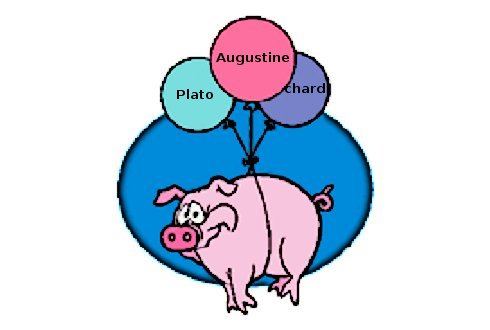podcast 137 – Daniel Whitby’s “Mystery and Revelation Inconsistent”
Should we defend what we think are biblical, yet unintelligible or seemingly incoherent claims as “mysteries”?
Should we defend what we think are biblical, yet unintelligible or seemingly incoherent claims as “mysteries”?
In the last thirty years or so, many Christian philosophers have become “social” trinitarians. Not only do they “use the social analogy” for the Trinity – that is, compare the Trinity to three humans – but they also, generally, affirm that the Trinity really does contain or consist of three selves- three beings capable of thought, action, and personal relationships. Dr. Hasker did this before… Read More »podcast 27 – Interview with Dr. William Hasker about his Metaphysics and the Tripersonal God – Part 1
Since I’m posting mildly entertaining nonsense lately, here’s a video from the, ahem, legendary Winterband. (Steve Winter, not Edgar & I assume, no relation), playing to a packed out basement (his own). Click if you dare.
Winterband is a power duo in reality, although Steve plays in three “persons”. (We must use this term, as we have none better.) Steve 1 plays lead and sings. Steve 2 plays rhythm. Steve 3 plays bass. And yet Read More »“You’re gonna burn, burn, burn, ’cause you would not learn.” (Dale)
A helpful two-on-two debate from April 2023: opening statements and rebuttals.
One final example, this time from veteran evangelical apologist Norman Geisler. In chapter 12 of his Answering Islam: The Crescent in Light of the Cross, Geisler gives a sort of standard exegetical argument for “the” doctrine of the Trinity. But he also addresses some Islamic concerns, and when he does, his modalism jumps to the foreground. Here, he tells us what is wrong with “modalism”.… Read More »Islam-inspired Modalism – Part 4

MMM indeed! Henry of Ghent doesn’t spare the medieval lingo, and as Scott points out, it seems he never met a trinitarian theory he didn’t like – emanation, psychology, relations – it’s all good! Thanks to its being Thanksgiving break – and let me say Happy Thanksgiving to all our American and Canadian readers – I’ve caught up on the recent posts, as well as some very involved comments on my original H.O.G. post. (To those just jumping in – we’re using some letters defined in this post – it actually helps!) Here are some comments and questions relating to the lengthy comments on my original H.O.G. post. Perhaps this’ll give Scott some grist for the mill as he continues his series on Henry’s trinitarian theory. Read More »H.O.G. Questions
How could God allow the church to err on something so important?
From a few months back, a very interesting post on Isaac Newton by Brandon, over at Siris. Newton’s is a part of a big, long, interesting and interlocking set of stories about subordinationists, “Arians”, and “Unitarians” in late 17th and early 18th century England. A good place to start is in chapter 29 & 30 of Wilbur’s 1925 book Our Unitarian Heritage, though his interests… Read More »Linkage: Isaac Newton on the Father and Son
Continuing our yarn from last time, imagine that our guru Opi changes his strategy. Now he instead tells his disciples that “Opi is the dopi” means that Opi is eternally the uniquely smartest teacher, and also that eternally, there is a teacher smarter than Opi. Here, he teaches them to believe an apparent contradiction, that eternally, Opi is and is not the smartest teacher. But is… Read More »10 steps towards getting less confused about the Trinity – #3 Take the mystery out of appeals to “mystery” – Part 3

More philosophical theology in a small town newspaper. This is a response to Steve’s column, but I’m really just trying to communicate with the broader public about the interest of Trinity theories. It is cross-posted at the Objectivist v. Constructivist v. Theist blog. – Dale
Thinking About the Trinity
12 26 08 (Published in The Observer 1 14 09)
Perhaps, dear reader, you’re a Christian considering New Years resolutions. Let me suggest a resolution to reflect more on theology to which you are committed. Trinity theories (they are many) are attempts to reconcile an apparently inconsistent set of four claims many readers find in the Bible: There is only one God, the one Jesus calls Father is God, Jesus is God, and Jesus is not his Father. From any three of these, it seems to logically follow that the fourth is false. (Go ahead – try out all the combinations.)
There is an official answer to this difficulty, Read More »Thinking about the Trinity
Can a historian conclude that Jesus thought he was God?
A leading Christian philosopher explains his “Social” Trinity theory.
Is saying that the NT “includes Jesus in the divine identity” clearer than saying in the NT “Jesus is God”?
Pastor J. Dan Gill was a third-generation Oneness (aka “Jesus only”) Pentecostal, but he started to notice a disconnect between their ways of talking about Jesus and what we read in the Bible.
Cross-examinations, closing statements, and audience Q&A – with post-debate links.
With this episode we continue our series on the 4th-century creed-producing councils of catholic bishops.
Do Christian claims clash with Philosophy?
In 1 Corinthians 8:6, Paul says, …yet for us there is one God, the Father, from whom are all things and for whom we exist, and one Lord, Jesus Christ, through whom are all things and through whom we exist. Is this statement by Paul a gift to unitarians (who hold that the one God is the Father, but not Jesus), or does he here… Read More »podcast 15 – Are Paul’s “one God” and “one Lord” one and the same?
McLatchie’s mistake about historical, mainstream Christian theologies.